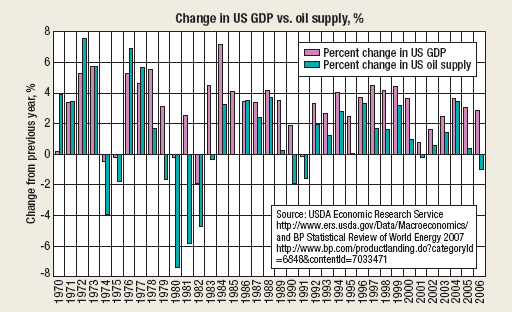Peaking in tongues. Peak oil advocates seem to need to prove, and sometimes over-prove, that peaking world oil production is a problem. The opening speaker at the recent 2007 Houston World Oil Conference (sponsored by the Association for the Study of Peak Oil) stated that there is a direct and proportional relationship between oil supply deficit and Gross Domestic Product (GDP). The US, he said, experienced oil shortages in 1973 and 1979 that caused the economy to go into a recession. The precise proportionality, he added, between oil supply deficit and GDP decline varies, but it is at least one-to-one. While this sounds reasonable, it isn’t true. The graph shows that following the 1973 Arab oil embargo, US annual oil consumption (essentially, supply) decreased by about 4% in 1974, but that GDP decreased only about 0.5%. In the following year, oil supply decreased 1.8%, but GDP decreased only 0.2%. Following the 1978 (Iranian Revolution) supply crisis, US consumption in 1979 decreased 1.7% but GDP rose 3.2%. In 1980, supply fell 7.5% but GDP only declined 0.23%. The next year (1981), supply was down another 6%, but GDP increased 2.5%. And so on. The data show that the relation between oil supply deficit and US GDP is not obvious, because GDP is affected by many other factors. The US economy was in serious trouble before the Arab oil embargo in 1973. The cost of the Vietnam War and the Great Society, doubling of the inflation rate, and a soaring trade deficit caused President Nixon to, in effect, devalue the dollar in 1971 by stopping its direct convertibility into gold. He also introduced wage-and-price controls and import tariffs to control the balance of trade. It is simplistic and incorrect to say that a decrease in oil supply alone caused this or any other US recession. I believe that the increasing dominance of the National Oil Companies (NOCs), and not the peaking of world oil production, is the greatest, most immediate impediment to meeting world oil demand. The NOCs control more than 75% of world production and limit the areas available for competitive exploration and development to less than 20% of the world’s petroleum basins. The international oil companies are forced to explore most of the same territory that they have been working in for at least the last 25 years. Is it any wonder that they are finding fewer reserves either through exploration or recovery growth? Underdeveloped, proven petroleum regions like Mexico, Saudi Arabia, Iran and Kuwait are completely closed to competitive exploration and field optimization. Other areas such as Russia and Venezuela are effectively closed to international activities because of governmental fiscal policy. In NOC-dominated countries where some degree of international activity is allowed, financial terms often make investment unattractive. Most, but not all, NOCs are inefficient in both exploration and production. Political patronage and corruption produce a workforce that lacks experience and critical skills. NOCs are usually acutely underfunded and are not able to manage exploration, field development and infrastructure properly. In addition, many NOCs (and their countries) have cultures that discourage initiative, problem-solving and expression of opinions through fear of being criticized and losing face.
There was almost no discussion of the NOC problem by speakers at the podium, although some speakers mentioned related issues like resource nationalism, export withholding and the declining production of some NOCs as contributing factors to the broader peak oil problem. However, there was one exception-a panel discussion participant who stated that NOCs are indeed the biggest impediment to world oil supply. Speakers at the conference presented the status of alternate energy research, and described scenarios to predict the severity of oil shortages. They were weak, however, on viable solutions to the peak production problem. It is not enough to describe the problem and to say that massive changes in consumption must occur to avoid disaster. Specific recommendations and action plans are needed. I propose that peak oil advocates stop complaining about reserve reporting practices by Saudi Arabia and other oil exporting nations, and learn what international oil companies learned long ago: It’s their country and their oil! Let me be clear: The peaking of world oil production is an important threat to world oil demand. To accomplish the effective use of the data presented, peakers must get beyond proving that peak oil is a problem and present concrete, actionable remedies. They should not over-prove the truth of peak oil through simplistic, but incorrect, arguments such as the direct relationship of oil supply deficit and economic recession. Solutions to the impediments created by NOCs will not be easy. In some cases, no solution exists. But at least there is some hope that NOC-controlled regions can be opened to international participation through diplomacy and political and economic pressure. At the moment, peak oil, like aging, can only be acknowledged, but not avoided.
|
||||||||
- Prices and governmental policies combine to stymie Canadian upstream growth (February 2024)
- U.S. producing gas wells increase despite low prices (February 2024)
- U.S. drilling: More of the same expected (February 2024)
- U.S. oil and natural gas production hits record highs (February 2024)
- U.S. upstream muddles along, with an eye toward 2024 (September 2023)
- Canada's upstream soldiers on despite governmental interference (September 2023)
- Applying ultra-deep LWD resistivity technology successfully in a SAGD operation (May 2019)
- Adoption of wireless intelligent completions advances (May 2019)
- Majors double down as takeaway crunch eases (April 2019)
- What’s new in well logging and formation evaluation (April 2019)
- Qualification of a 20,000-psi subsea BOP: A collaborative approach (February 2019)
- ConocoPhillips’ Greg Leveille sees rapid trajectory of technical advancement continuing (February 2019)





